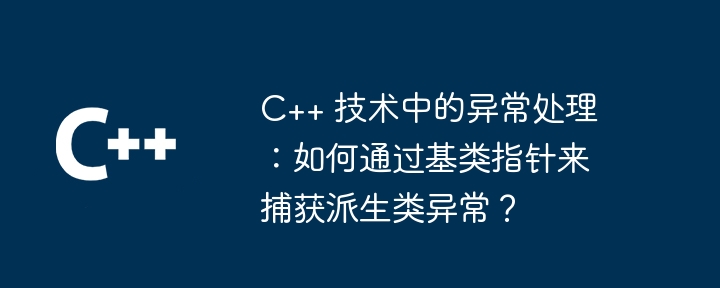
In C, derived class exceptions can be caught through base class pointers. Using virtual functions and try-catch blocks, we can: Throw a derived class exception Catch it using a base class pointer Automatically release the derived class object by deleting the base class pointer

Exception handling in C: Catching derived class exceptions through base class pointers
In C, exception handling is a mechanism for handling errors and exceptions. When an exception occurs, an exception object is thrown. Exception objects store information about the error, such as the error message and the location where the error occurred.
Catching derived class exceptions through a base class pointer is a flexible way to handle exceptions from derived classes. This is achieved using try-catch blocks and virtual functions.
Code example:
Suppose we have a base class Shape and a derived class Square. The Shape class has a virtual function GetArea(), which is overridden by the Square class.
class Shape {
public:
virtual int GetArea() const = 0;
};
class Square : public Shape {
public:
Square(int side) : side(side) {}
int GetArea() const override { return side * side; }
private:
int side;
};
int main() {
try {
Shape* shape = new Square(5);
shape->GetArea(); // 抛出异常
} catch (Shape* base_ptr) {
// 捕获 Shape* 指针的基类指针
delete base_ptr; // 确保释放派生类对象
std::cout << "异常捕获成功!" << std::endl;
}
return 0;
}Explanation:
GetArea() throws an exception in the derived class Square. main() function, we create a Shape* pointer pointing to a Square object. shape->GetArea() is called, it actually calls the overriding function of the derived class and throws an exception. catch block uses the base class pointer base_ptr to catch the exception object. base_ptr and automatically release the pointer to the derived class object. The above is the detailed content of Exception handling in C++ technology: How to catch derived class exceptions through base class pointers?. For more information, please follow other related articles on the PHP Chinese website!
 What are the differences between c++ and c language
What are the differences between c++ and c language
 Recommended learning order for c++ and python
Recommended learning order for c++ and python
 Cost-effectiveness analysis of learning python and c++
Cost-effectiveness analysis of learning python and c++
 Is c language the same as c++?
Is c language the same as c++?
 Which is better to learn first, c language or c++?
Which is better to learn first, c language or c++?
 The difference and connection between c language and c++
The difference and connection between c language and c++
 C++ software Chinese change tutorial
C++ software Chinese change tutorial
 Cost-effectiveness analysis of learning python, java and c++
Cost-effectiveness analysis of learning python, java and c++




